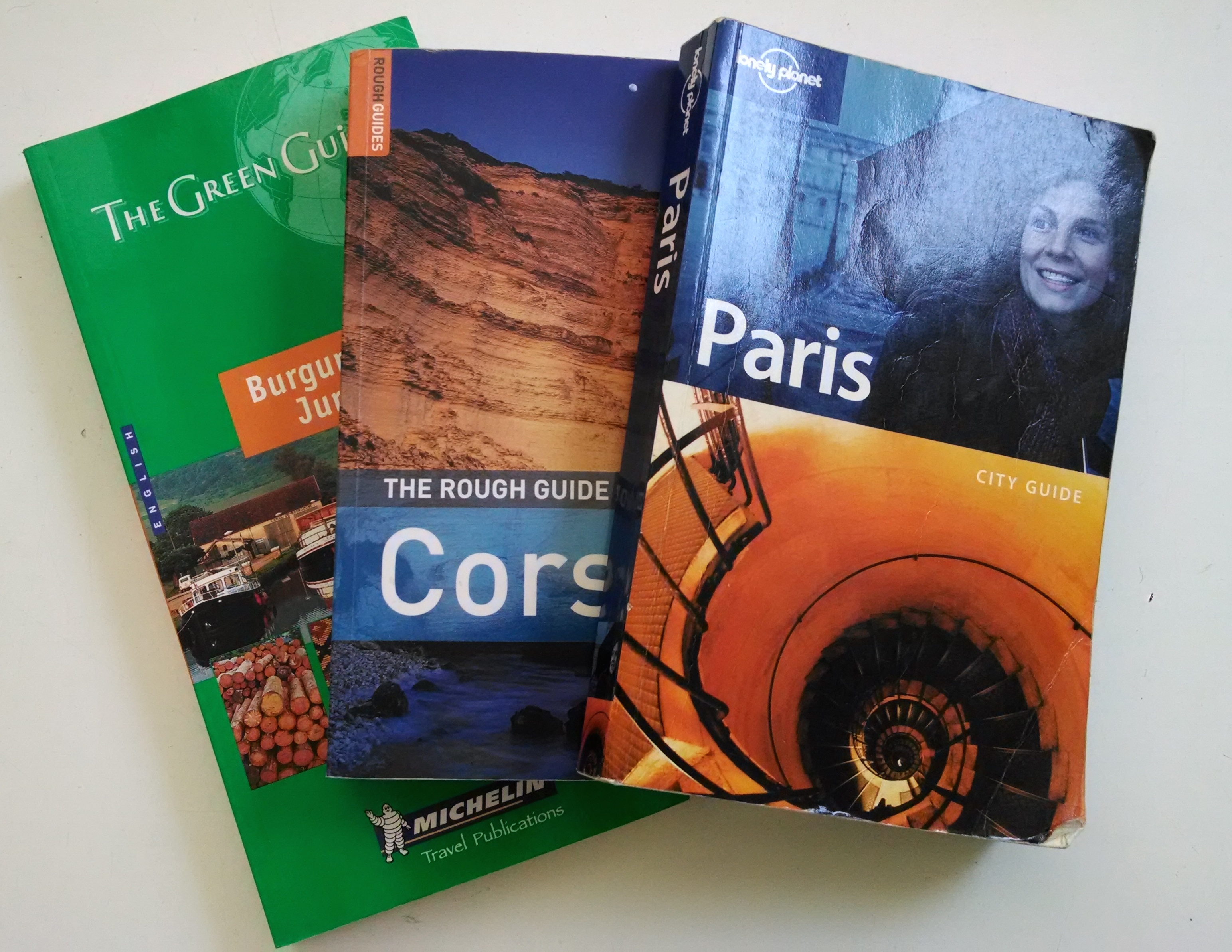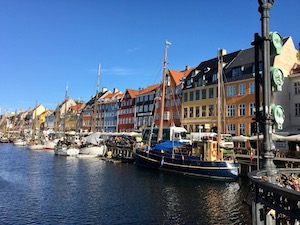Why Travel is a Great Language Motivator
 Traveling can be a great motivator for learning a new language. As you're making your travel plans, don't forget the language(s) you may encounter.
Traveling can be a great motivator for learning a new language. As you're making your travel plans, don't forget the language(s) you may encounter.
Obviously this does not work so well for trips such as “Europe: 6 Countries in 7 Days” or similar offerings. (All you need in this case are the 10+ essential greetings and polite phrases of many European languages you can practice for free with Lingo-Late.)
But if your plans include a stay of a couple of weeks or so in one country, or even in one city, learning at least the basics of the local language should be part of your preparations.
(As readers of previous posts will know, after our [first] retirement we enjoyed longer stays in several European cities and countries, see also Learning Spanish..)
Our three-week trip to Denmark in 2017 motivated us to learn Danish with Duolingo and Pimsleur. (We'll report about our experiences with Danish in a future post.)
Did You Learn a Language in School?
Learning a language in school is a very different experience from learning one outside of the classroom. What is a "school subject" on the one hand, becomes a "hobby" when you're no longer in school. It becomes a way of trying new things and discovering new places.
A school subject includes daily homework exercises, classroom lectures and drills, tests, exams, and grades. And who likes to be called on in class? All that can be a chore and may well put a damper on your enthusiasm.
On the other hand, learning a language as a "hobby" puts you in charge of your own learning. It's an adventure. Not only do you learn new skills, you explore other cultures and make new friends. Language learning can be a perfect tool for self-discovery and self-development.
And, who knows what new doors a second language will open in your work life, or even in your planning for retirement?!
A Motivator: Your Imagination!
If you drop the "school-subject mindset", learning a languagecan be a fresh and fun experience. One way to do this is to tie language learning to planning a trip.
 Often, as we plan and organize a trip, we anticipate being there. We imagine touring the Reichstag Dome in Berlin; enjoying a caffè macchiato in Trastevere, Rome; strolling through the Marché Mouffetard in Paris; taking a night tour of the Alhambra, in Granada.
Often, as we plan and organize a trip, we anticipate being there. We imagine touring the Reichstag Dome in Berlin; enjoying a caffè macchiato in Trastevere, Rome; strolling through the Marché Mouffetard in Paris; taking a night tour of the Alhambra, in Granada.
Or as we did before our trip through Denmark: picturing ourselves strolling through the streets of Copenhagen, ordering an "øl" in one of the harbor-side bistros on Nyhavn (picture), exploring the Hamlet castle in Helsingør. We made your imagination the motivator for learning Danish!
In Visitors' Shoes in the US
 Why does knowing the local language matter? Imagine yourself coming to the US without knowing any English. You would certainly experience the country and its people as a tourist, from the outside.
Why does knowing the local language matter? Imagine yourself coming to the US without knowing any English. You would certainly experience the country and its people as a tourist, from the outside.
Imagine having to ask everyone, every time: Sprechen Sie Deutsch? Parlez-vous français? Parla italiano? Or, Habla español? If you stayed a little longer, you would of course pick up a few words.
But if you had learned some basic English phrases ahead of your trip, your interactions with us locals would be more meaningful. I bet you'd enjoy your stay so much more.
It's the same for us when we travel abroad. The better we speak the local language, the more deeply we experience the place and its people. Being able to communicate allows us to go off the beaten track and feel confident about doing so.
We try to go with the idea that not everyone speaks English. It's something we actually have found to be true in many cases, especially if you venture off the beaten track.
The Beginner's Conundrum
However, in countries like Denmark where nearly everybody speaks English, it is often hard to practice your new language: Danish people switch immediately to English when your Danish does not seem to be authentic.
I (Ulrike) was therefore quite pleased, when a woman in a small town, whom I asked (in Danish) for directions to a bank ATM, answered in Danish. However, I also experienced the “Beginner's Conundrum”: When her answer came back in rapid fire Danish, I was lost. She switched to English, but I just asked her to continue in Danish and to slow down.
We indeed found the Bank with an ATM and could replenish our travel funds. That early success encouraged us to use our Danish as much as we could: when ordering food, buying tickets, asking for information, etc.
And if you wonder why we don't like to use an ATM at night or not connected to a bank, read about our experience in Seville, Spain: 5 Tips for Dealing with ATM Troubles Abroad (and at Home).
Why Learn Danish at all?
Why did we persist, even though English is so widely spoken and Danes themselves tell us not to learn Danish because it's too difficult. Yes, why?
When you're in another country, you're in a totally new environment. Everything's different, the way people interact, the look of the countryside, the bustle of the towns, the taste of the food, and obviously, the sound of the language. By using the local language, you're no longer experiencing the country just from the outside.
So, if you have a travel destination on your bucket list, add learning the language to your preparations. Give yourself, let's say three months, like we did with Danish. And then see how much of the language you can acquire in that time.
Use whatever resources you enjoy (flashcards, songs, films with subtitles, etc.) and just keep going, a little bit every day. As an added benefit, you'll sharpen your memory and train your ear. And when you arrive in the country you're visiting, challenge yourself to speak up whenever you can! Try to experience your visit as a mini-immersion.
Peter's Confession
I have to confess that I have developed a love-hate relationship with Danish. Even though Danish is a Germanic language and there are many words I can decipher when I READ them, I'm still a long way from SPEAKING Danish, or rather – pronouncing it correctly.
Why is that? It's because Danish spelling is not phonetic in many cases: Not only are many endings not pronounced at all, but certain vowel and consonant combinations produce very unfamiliar sounds, at least to my German ear.
Examples of Danish pronunciation as I hear them:
• jeg (I) - <yigh>
• mad (food) - <melth> and spelled differently but sounding very similar to
• meget (much) - <melth>
• det er ikke nogen (there isn't anything) - <de ehr igge noarn>
Nevertheless, I am continuing with Danish using Pimsleur, Duolingo and Memrise lessons at the moment, and hope to be able to listen soon to some LingQ mini-stories. (as Ulrike is already doing). The Pimsleur audio course for Danish lets me focus more on listening and pronunciation, without getting confused by the non-phonetic spelling.
Why am I continuing with Danish when our travels are behind us? Because I want to figure out at least the most common Danish pronunciation rules and I won't stop until I do. What started out simply as preparation for a trip to Denmark now has become a personal challenge as well as a way to keep my brain sharp.
And what keeps motivating me to continue are my memories of our wonderful trip - and my determination to figure out the Danish pronunciation rules. I'll keep you updated about my success (or failure)!
So, pick a travel destination and, yes, jump into your new language. This too is an exciting adventure. Do it with enthusiasm and with imagination, and find your motivation to stick with it. Then go there and speak up!
Bio: Ulrike & Peter Rettig are co-founders of Gamesforlanguage.com. They are lifelong language learners, growing up in several European countries before moving to Canada and the United States. You can follow them on Facebook, Twitter and Instagram, and leave any comments with contact.
